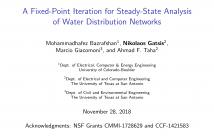
- Read more about Learning to dynamically price electricity demand based on multi-armed bandit
- Log in to post comments
- Categories:
 27 Views
27 Views
- Read more about A Fixed-Point Iteration for Steady-State Analysis of Water Distribution Networks
- Log in to post comments
- Categories:
 32 Views
32 Views
- Read more about Persistent Hyperspectral Observations of the Urban Lightscape
- Log in to post comments
- Categories:
 201 Views
201 Views
- Read more about Cyber attacks on Smart Energy Grids Using Generative Adversarial Networks
- Log in to post comments
Recently, cyber-attacks to smart energy grid has become a critical subject for Energy System Operators (ESOs). To keep the energy grid cyber-secured, the attacker’s behavior, resources and goals must be modeled properly. Then, the counter-measurement actions can be designed based on the attacker's model. In this paper, a new zero-sum game based on the Generative Adversarial Networks (GANs) is presented. The attacker to energy smart grid pursues two objects.
- Categories:
 170 Views
170 Views
- Read more about Kernel-Based Learning for Smart Inverter Control
- Log in to post comments
Distribution grids are currently challenged by frequent voltage excursions induced by intermittent solar generation. Smart inverters have been advocated as a fast-responding means to regulate voltage and minimize ohmic losses. Since optimal inverter coordination may be computationally challenging and preset local control rules are subpar, the approach of customized control rules designed in a quasi-static fashion features as a golden middle. Departing from affine control rules, this work puts forth non-linear inverter control policies.
- Categories:
 32 Views
32 Views
- Read more about SPARSE ERROR CORRECTION FOR PMU DATA UNDER GPS SPOOFING ATTACKS
- Log in to post comments
Time-synchronized phasor measurements from phasor measurement units (PMUs) are valuable for real time monitoring and control. However, their reliance on civilian GPS signals makes them vulnerable to GPS signal spoofing attacks which can be launched by an adversary to falsify PMU data entries.
- Categories:
 31 Views
31 Views
- Read more about Coincident Peak Prediction Using a Feed-Forward Neural Network
- Log in to post comments
A significant portion of a business' annual electrical payments can be made up of coincident peak charges: a transmission surcharge for power consumed when the entire system is at peak demand. This charge occurs only a few times annually, but with per-MW prices orders of magnitudes higher than non-peak times. A business is incentivized to reduce its power consumption, but accurately predicting the timing of peak demand charges is nontrivial. In this paper we present a decision framework based on predicting the day-ahead likelihood of peak demand charges.
- Categories:
 25 Views
25 Views
- Read more about LARGE-SCALE ADAPTIVE ELECTRIC VEHICLE CHARGING
- Log in to post comments
Large-scale charging infrastructure will play an important role in supporting the adoption of electric vehicles. In this presentation, we describe a unique physical testbed for large-scale, high-density EV charging research which we call the Adaptive Charging Network (ACN). We describe the architecture of the ACN including its hardware and software components. We also present a practical framework for online scheduling, which is based on model predictive control and convex optimization.
- Categories:
 21 Views
21 Views
- Read more about Real-Time Power Outage Detection System using Social Sensing and Neural Networks
- Log in to post comments
- Categories:
 22 Views
22 Views